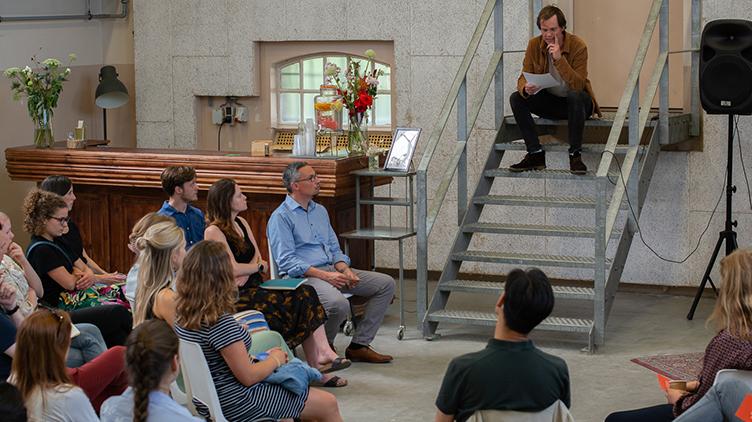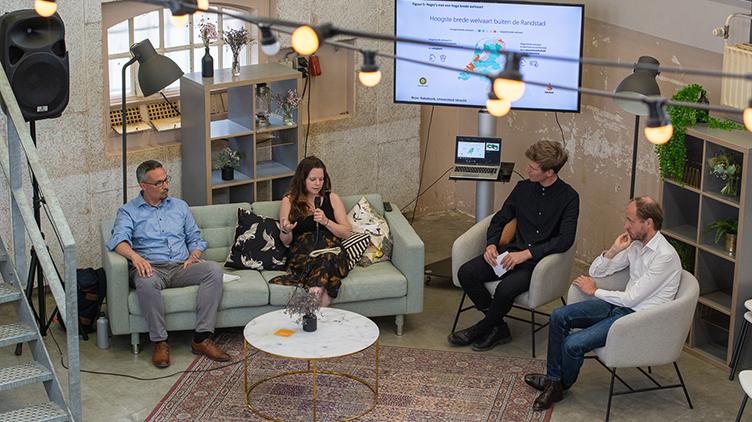A plea for mutual appreciation
Lecturer and student hold each other in a ritual dance

A few years ago, I graduated in Global Sustainability Science, which was called Environmental Studies back then. Today, I work in the same department as a junior assistant professor, teaching students from the same study programme. This means I am familiar with both sides of the relationship between lecturers and students.
These past few years, I’ve seen the number of students increase steadily as a result of internationalisation efforts and the globalisation of education. Due to this new business model (article in Dutch, Ed.), the students’ curriculum had to be formulated more "efficiently", a shift that can be seen in the proliferation of group work, peer feedback sessions, and independent study hours.
A striking example of cost-efficient adjustments was in the news quite recently, when an educational method called High Impact Learning that Lasts (HILL), which is used at the Fontys University of Applied Sciences, was discussed (article in Dutch, Ed.). In this system, the lecturer’s responsibilities are passed on to the student, who is claimed to be the owner of their own learning curve. As a consequence, the lecturer fades more and more into the background. They barely teach anymore, focusing on moderating group processes and grading student work instead.
Recognition
At research universities, most lecturers also have research-related tasks. Despite the increased recognition for lecturers, research remains the main yardstick for how we function and, therefore, for the possibilities of promotion or tenure. These are systemic issues within educational and research, and I worry about the students and lecturers working in this system. We’re not capable of changing radically and immediately. Our power as individuals lies in the way we let this regime shape us. And, in this aspect, there’s still a lot of progress to be made.
I believe that we humans want to be seen for the effort and energy we put into things. This applies to students when they study for exams or pull all-nighters to write their assignments, but also to lecturers, who invest that energy when carefully reading texts and assignments submitted by students, scheduling additional Q&A sessions, and thoroughly evaluating their courses so they can do better next year. The recognition we get for the energy we spend is what makes our endeavours meaningful.
When I look at how things are done in practice, I spot a lot of things that are going wrong with regards to mutual recognition. I’d love to see mutual recognition make a comeback in the way we engage with each other, which often doesn't work right now. Each student has their own story and wants to be seen as an individual in their learning process. Consider the fact that they enter a study programme with a name, a background, and their own interests. Students want to be addressed and understood individually. When giving them feedback on an essay, be it positive or negative, the comments should be aimed at them specifically. It should be clear that the lecturer really read the essay. The same applies to work groups: no one wants ready-made answer sheets and rubric forms. Instead, students prefer getting attention and recognition when submitting something.
As for lecturers, they want to the attention they pay to the learning process to be seen as well. It’s important to recognise these efforts when you see them reflected in different learning moments. Despite the cost-efficient elements of a curriculum, a lot of thought is still put into the students' best interests. Lecturers want students to appreciate their effort by putting an effort themselves — when the lecturer organises an additional activity, for instance. Students are not consumers buying their education and complaining when they are not being served (blog in Dutch, Ed.). People should see the human in the lecturer.
Students drop out in disappointment
How can it be that this relationship often doesn't work? It seems as though we’re engaging in a mandatory dance: a feedback loop that’s hard to break through. As a lecturer, if I forget the students behind the assignments or if I can't give them enough attention because I have a lot of work to do, they will probably be disappointed and stop showing up to my classes. After all, why would you go to a class if you’re not appreciated and understood? And, when students stop showing up, as a teacher I understand that they are no longer interested. So, why would I invest more time and effort in those students if they don’t even show up to class anyway?
This feedback loop is powerful and a tricky thing to break free from. We are keeping each other in a headlock and quickly falling back into an obligatory detachment dance. However, I’m convinced that we can break free from these powers. It requires a lot of effort from both lecturer and student but, that way, we can even create an upwards cycle, in which we will strengthen each other.

Photo: Academy of Hope
Academy of hope
A good example of this process is the research project Academy of Hope, created by the geographers Peter Pelzer and Jesse Hoffman in the Urban Future Studio. In this project, appreciation from both sides shines through, which results in an energetic, motivated learning process. In my view, it offers a lot of room for students’ ideas, which is certainly appreciated by them. It is a chicken or egg question, wondering who the initiator of this dynamic is. But, at the bottom line, they are both required for a successful course.
The project assumes an active attitude for advanced students, which results in both parties managing to break free from that dance. If you're a student, expect to get personal attention from your lecturer but also expect to voice your appreciation of the energy invested by the lecturer in your education. And, if you are a teacher, expect students to be committed and involved, but also keep an eye on the student’s personal development. If that conviction is absent, you should ask more questions to find out why.
Let it be clear that I am also a victim and perpetrator in this process, and I often catch myself being less than motivated when I receive a sloppily-written article from a student. Who are we fooling, really? The student didn’t want to write it and I’m only guiding the process with reluctance. It’s hard to take that step forward and move away from this detached, perfunctory mode.
It’s an illusion to think we can reach all students like this. For some of them, this movement will pass them right by. But it works great for others, so make sure you're in touch with them personally. Again, there are certain systemic issues that greatly disrupt this personal contact but it is within our power to dance out of step and resist the regime of the music.